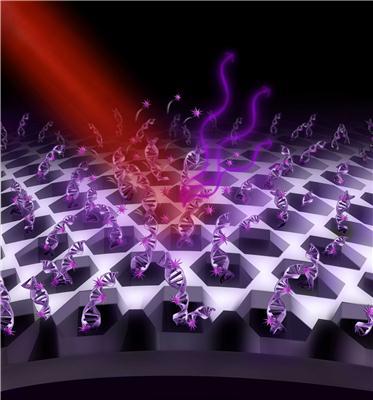Scientists at the Faculty of Engineering’s Department of Bioengineering of the National University of Singapore have developed a technique to manipulate gene expression by utilizing nanoparticles that are capable of transforming near-infrared (NIR) light to ultraviolet light or visible light.
 NIR is a safe light as opposed to UV light, which could cause damage to cells. NIR can also penetrate deeper into tissues to target tumours. (Graphic by Mr Muthu Kumara Gnananasammandhan.)
NIR is a safe light as opposed to UV light, which could cause damage to cells. NIR can also penetrate deeper into tissues to target tumours. (Graphic by Mr Muthu Kumara Gnananasammandhan.)
The research team headed by Associate Professor Zhang Yong has successfully demonstrated the novel technology in controlling gene expression and hindering tumor growth in mice. This method opens the door to develop a much safer non-invasive photodynamic therapy to treat deep cancer utilizing nanoparticles.
To maintain the health of people, certain proteins are leased by genes to ensure the occurrence of normal internal ‘machinery’ works. Nevertheless, this process may go wrong sometimes, thus causing body to malfunction, which in turn results in illness. To rectify these issues, physicians may use ultraviolet light to manipulate the gene expression process. Nonetheless, the ultraviolet light may do more harm than good.
On the other hand, NIR is non-toxic and can infiltrate deeply into the tissues, informed Zhang. After safely reaching the targeted sites, the NIR is effectively up-converted to ultraviolet light by nanoparticles developed by the team to trigger the genes in the desired ways. The nanoparticles were able to efficiently control the amount, timing and duration of the release of proteins by the genes.
This nanoparticle technology holds potential in other light-based therapies as its up-conversion nanoparticles are also capable of converting the NIR to visible light. These nanoparticles, covered with mesoporous silica coating, are each assigned to perform ‘up-conversion.’ They can be utilized for bioimaging by attaching them to a biomarker that provides better imagery of cancerous cells and tumors subsequent to its attachment to cancer cells.
At present, the team is working with scientists at the National Cancer Centre Singapore to evaluate the efficacy and safety of the nanoparticle technique for pilot clinical studies in the future. It is also involved in several other projects to use the technology for the development of point-of-care diagnostics to detect different diseases.
The study results have appeared in the Nature Medicine journal.
Source: http://www.nus.edu.sg